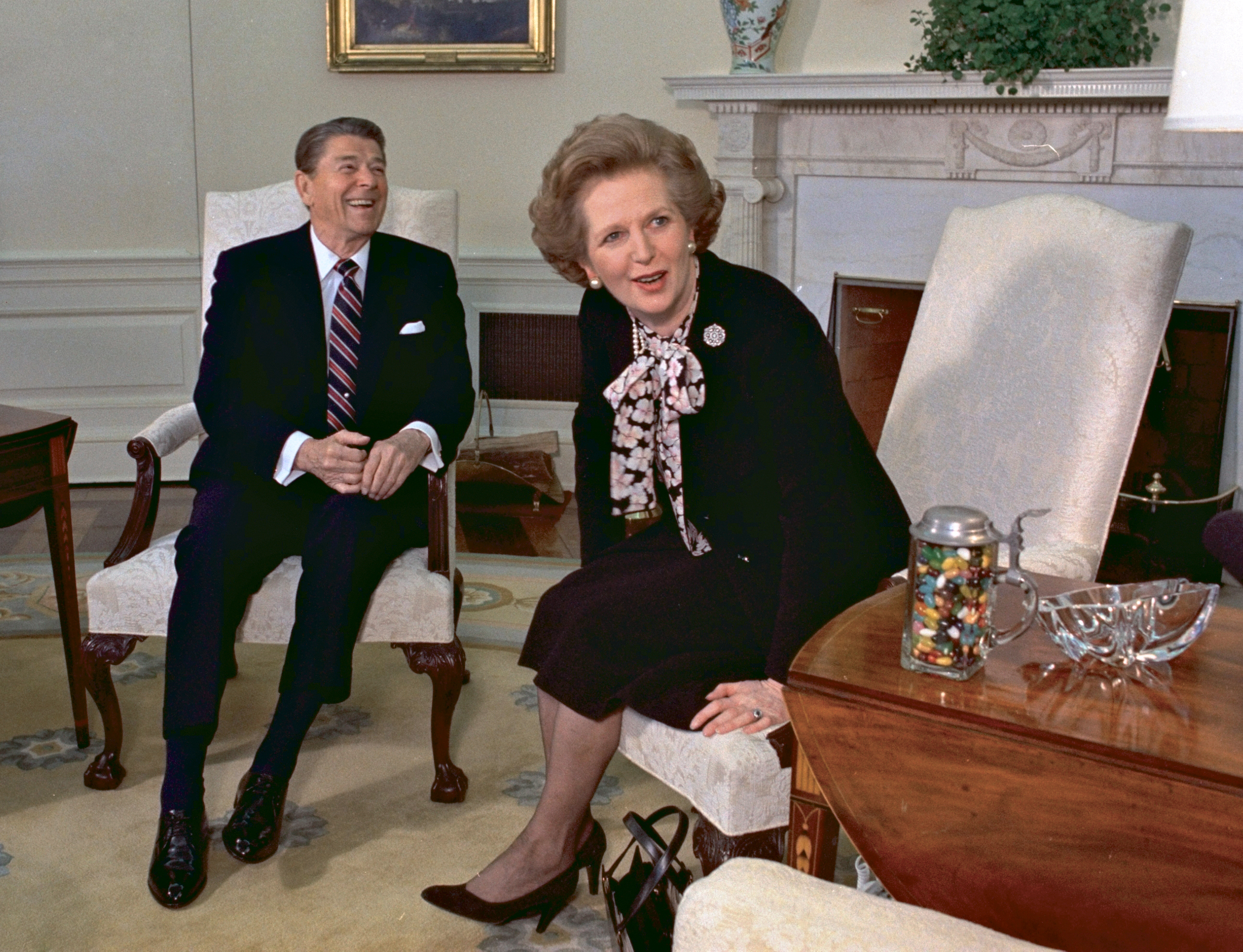WASHINGTON - Margaret Thatcher and Ronald Reagan, two self-assured and firm-speaking conservatives, joined forces in the early 1980s and drastically changed the economic and political landscapes in both of their countries.
Their calls for more-austere government and lower taxes still resonate with conservatives on both sides of the Atlantic. And their side-by-side standing up to Soviet communism is credited by those of all political stripes as hastening the end of the Cold War.
Thatcher died Monday in London of a stroke at 87.
The British prime minister and the American president had the kind of personal bond that is extremely rare at such high levels of power.
She was the first and last White House State Dinner guest during Reagan's eight-year presidency. And when he died in 2004, at 93 after suffering for years with Alzheimer's disease, a frail Thatcher attended his state funeral.
"They had similar backgrounds and in some ways could understand what the other was experiencing," said Heather Conley, director of Europe programs for the Center for Strategic and International Studies in Washington.
"And they had unique solidarity. They were tough, they were single-minded in many ways. Some have argued that that lack of complexity was their shortcoming. But in some ways, their focus was their strength," Conley said.
Reagan and Thatcher forged a special friendship "from the very beginning, the first time they met," former first lady Nancy Reagan said Monday.
"I loved it that she and Ronnie were as close as they were," she told Fox News.
Thatcher led Britain's Conservative Party to three election victories, governing from 1979 to 1990. Reagan was president from 1981 to 1989.
Both cut income taxes deeply and reined in national government spending. Both favored privatizing many government functions. Both stood up to organized labor. Both tackled inflation. Both were strong advocates of free markets and increased open international trade.
And both had a lasting - and controversial - impact on their own and opposing political parties in their respective nations.
Reagan's supply-side theories that lower taxes can stimulate growth - like a rising tide that lifts all ships - was derided as "Reaganomics" by critics and even once called "voodoo economics" by the Republican who went on to serve as his vice president and later as president himself, George H. W. Bush.
Even today, it is hard for American Republicans to support any increase in taxes - a Reagan legacy that still makes it difficult for Democrats and Republicans to find common ground on tax legislation.
In Britain, Thatcher's policies were dubbed "Economic Thatcherism."
"Using deregulation and privatization, she restored Great Britain, once dismissed as the 'sick man of Europe,' to its position as a world power. Indeed, her policies led the way and inspired other nations - including those in newly free Eastern Europe - to adopt similar reforms to boost their economies," Ed Feulner, former president of the conservative Heritage Foundation, wrote Monday in a tribute.
"An intrepid warrior for freedom and human dignity, Prime Minister Thatcher stood with her 'noble friend,' President Ronald Reagan, to confront the Soviet empire when it was at its peak," Feulner added.
Thatcher's efforts in advancing conservative causes and programs in Britain may have strengthened Reagan's hand in selling his conservative agenda at home, and vice versa.
Conservatives at the time viewed the political victories of the two allies as part of a worldwide trend moving in their direction - a trend that has since run into a lot of bumps in the road.
Today's widely held warm and fuzzy image of the Reagan-Thatcher alliance of three decades ago may have been fortified and blurred somewhat by the passage of time.
"They were actually very similar, but very different from what many people today think they did," said Bruce Bartlett, an economic adviser to Reagan and Bush.
While Thatcher and Reagan were both economic conservatives at heart, "they were also much more pragmatic about what could be done" than many of today's conservatives, Bartlett said. "And they both accepted the legitimacy of the welfare state. They just tried to make it work better and reduce its cost."
While both are known for slashing taxes and cutting spending, Reagan also supported many later tax increases and backed raising the government's borrowing authority many times. Thatcher raised her nation's value-added tax.
The two had vastly different governing styles. Reagan projected radiant optimism and cheerful agreeability. Thatcher, who came to be known as the "Iron Lady," exhibited relentless determination.
And they sometimes disagreed. For instance, Thatcher didn't get the level of support she wanted from Reagan during the Falklands War crisis. And Thatcher was miffed and annoyed by Reagan's 1983 invasion of the tiny Caribbean island nation of Grenada.
Still, "she was a great partner with the United States," said former top State Department official Nicholas Burns, including being the one who persuaded Reagan that Soviet leader Mikhail Gorbachev was "someone we can do business with."
Apparently her warmth with Reagan didn't fully convey to Bush, Reagan's successor.
While she fully supported Bush on confronting Saddam Hussein after Iraq's August 1990 invasion of Kuwait, she was a little concerned about his resolve. "So this was the reason I said, 'Look, George, this is no time to go wobbly," she later recalled.
The elder Bush issued a statement Monday declaring: "America has lost one of the staunchest allies we have ever known."

